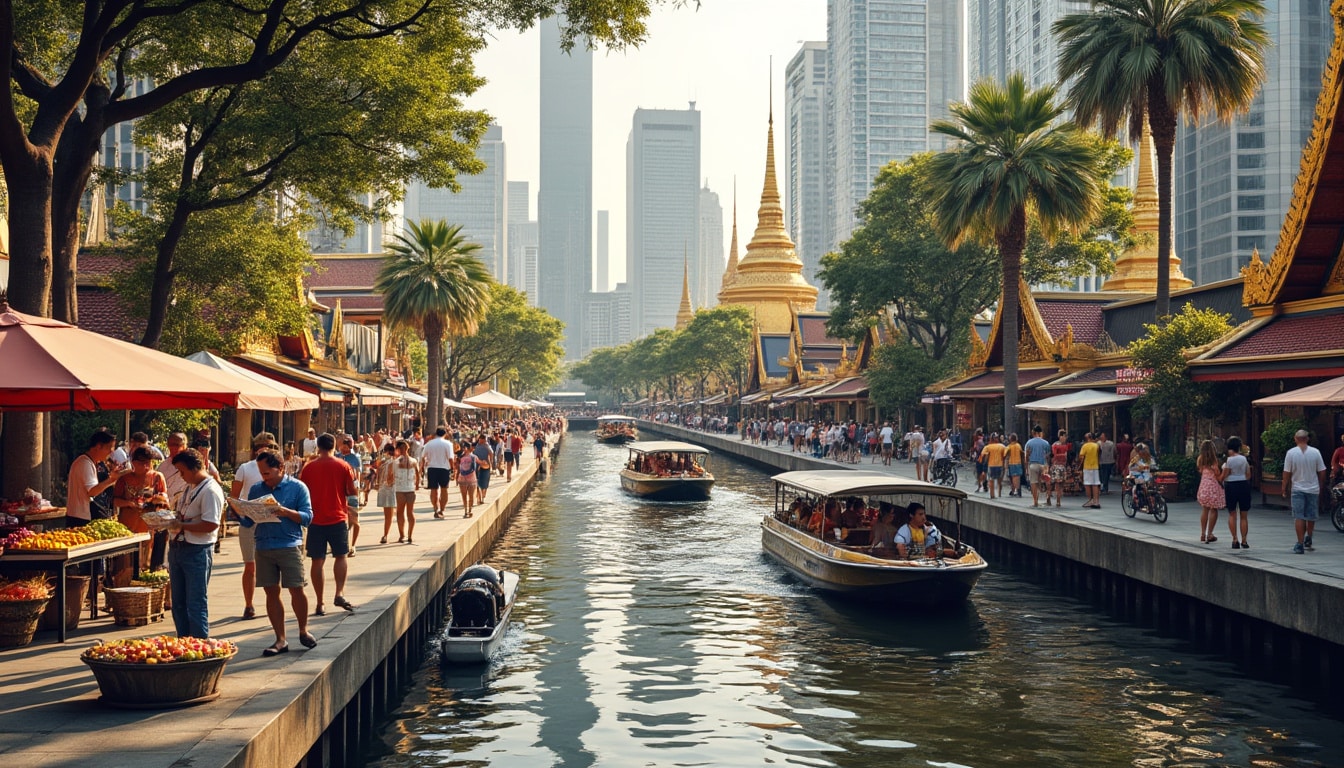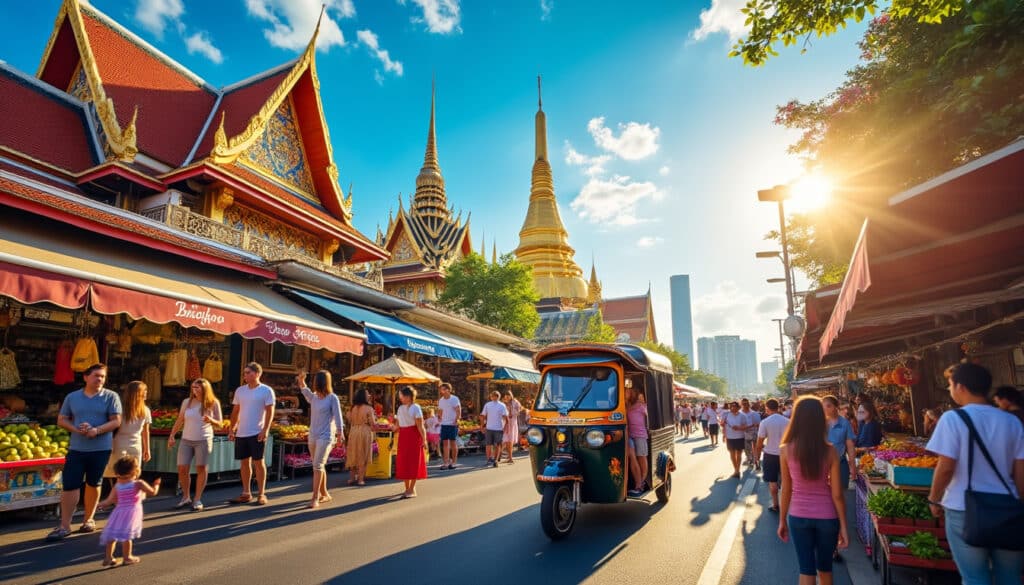Bangkok, a city known for its vibrant street life, timeless culture, and dynamic urban environment, extends beyond just being Thailand’s capital. This bustling metropolis is characterized by its unique demographic composition and geographical footprint, weaving a complex tapestry that encapsulates both the traditional and the modern. Understanding the demographics and geography of Bangkok is pivotal to appreciating how this city has transformed into Southeast Asia’s heart. It’s not just about the figures; it’s about the rhythms of daily life, the juxtaposition of serenity and hustle, and the stories whispered by its bustling streets and ancient temples.
Understanding Bangkok’s Population Dynamics
The population of Bangkok has grown exponentially over the past few decades, setting it apart as one of the most dynamic cities in Southeast Asia. In 2025, it is estimated that the city’s population exceeds 11 million, which represents a significant portion of Thailand’s total population. Historically, Bangkok’s growth can be attributed to several factors, including economic developments, urban planning, and migration trends.
Bangkok’s history as a trade center and political hub has driven migration from rural areas to the city. The lure of better job prospects, especially within multinational corporations and burgeoning industries like tourism and technology, continues to attract Thai and international migrants. Large companies such as Bangkok Airways and Thai Airways fuel the city’s growing reputation as a business nucleus.
Alongside economic opportunities, educational institutions such as international schools and universities bolster migration. This educational appeal draws not only students from across Thailand but also from neighboring countries and beyond, contributing to the city’s youthful demographic.
Interestingly, Bangkok is home to a variety of immigrant communities, making it a veritable cultural melting pot. The city’s demographics include large groups of Chinese, Japanese, Indians, and various expatriates who have integrated into Thai society, contributing to its vibrant cultural tapestry.
Here is a demographic breakdown:
| Ethnic Group | Population | Percentage |
|---|---|---|
| Ethnic Thais | 8 million | 72% |
| Chinese | 70,000 | 0.63% |
| Japanese | 90,000 | 0.81% |
| Indians | 55,000 | 0.50% |
| Others | 190,000 | 1.7% |
This table highlights the diversity within Bangkok, reflecting how the city has evolved into a cosmopolitan landmark. The integration of these varied cultures significantly enriches the local community, evident in the vibrant street food offerings and festivals that dot the city’s calendar.
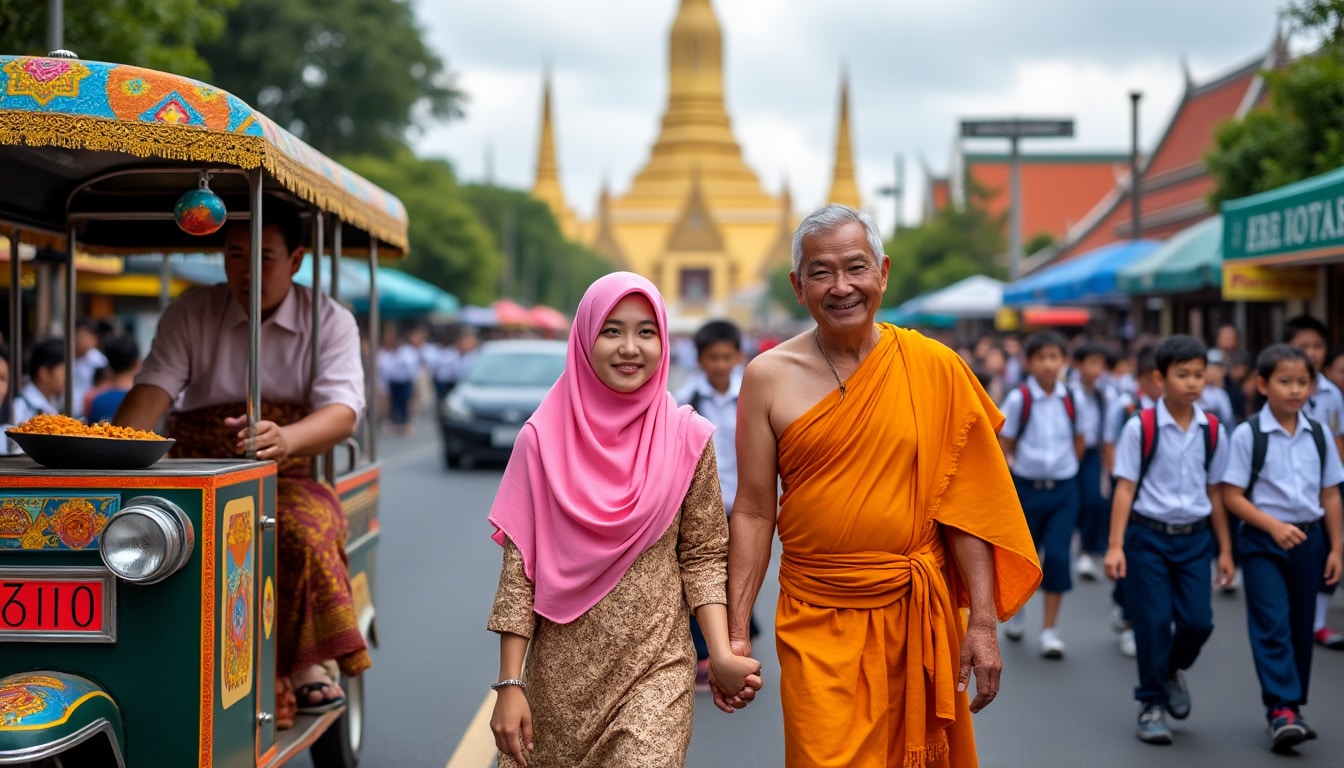
Geographical Landscape of Bangkok
Bangkok’s geography is as compelling as its demographics. Located in the Chao Phraya River delta, Bangkok covers an area of approximately 1,569 square kilometers. This setting not only contributes to the city’s lush landscapes but also to its complex urban challenges. The river is a lifeline for the city, offering not only beauty but also transport avenues that alleviate the infamous Bangkok traffic.
The network of canals, which earned Bangkok the epithet “Venice of the East,” intertwines with its geography to offer stunning vistas and unique transportation options like the Chao Phraya River Cruise. This unique geographic attribute serves both as a tourist attraction and as a functional part of daily commute for many Bangkokians.
Geographically, Bangkok is bounded by the provinces of Nonthaburi, Pathum Thani, Samut Prakan, Nakhon Pathom, and Samut Sakhon. This placement among Thailand’s central plains affords it both strategic importance and susceptibility to environmental challenges such as flooding, necessitating extensive urban planning and infrastructure development, including policies for sustainable urban growth.
The city’s geographic attributes also play a pivotal role in Bangkok’s economic activities. Major shopping centers like CentralWorld and Siam Paragon are often located in sprawling complexes that highlight Bangkok’s modernist architecture. Meanwhile, traditional outdoor markets such as the Chatuchak Weekend Market thrive by utilizing the city’s flat expanses, offering everything from local handicrafts to exotic foods.
Challenges and Opportunities in Bangkok’s Urban Development
The demographic and geographic intricacies of Bangkok play significant roles in shaping its urban development. Despite being a vibrant city offering numerous opportunities, Bangkok faces several urban challenges, particularly with its infrastructure which struggles to keep pace with rapid growth. The city’s layout, developed centuries ago, often complicates modern urban planning efforts.
One major concern is traffic congestion, which remains a daily challenge for residents. Although public transportation options, such as the BTS Skytrain and the extensive bus system, have been expanded, they are often insufficient in addressing the city’s transportation needs comprehensively. Innovations like the extension of metro lines aim to mitigate this issue but require ongoing development.
Aside from traffic, housing shortages pose another significant challenge. As more people flock to Bangkok for its economic prospects, the demand for affordable housing intensifies. Urban sprawl has led to the rise in informal settlements and increased strain on public services. Despite this, Bangkok’s government and private sectors are making headway with projects promoting vertical living and sustainable housing solutions.
Despite these challenges, Bangkok is a city of opportunities. The influx of people and businesses facilitates vibrant mixed-use developments. Integrating residential, business, and recreational spaces, these efforts attempt to create self-contained ecosystems that reduce the need for commuting long distances. The city is also investing in green spaces and parks, which offer respite from the urban hustle and exemplify Bangkok’s commitment to a livable environment.
- 🚦 Enhance public transportation: Continued investment in metro and bus systems to mitigate traffic.
- 🏗️ Promote vertical growth: Develop high-rise buildings to combat horizontal urban sprawl.
- 🌳 Expand green areas: Increase parks and public gardens to enhance living conditions.
- 💡 Encourage mixed-use developments: Self-sustained communities to reduce commute distances.
The Blend of Culture and Population in Bangkok
Bangkok’s rich blend of culture and demographics makes it one of the most intriguing cities globally, with diverse communities contributing to its multifaceted identity. The Chinese, Indian, and Japanese minorities, along with local Thai residents, add to Bangkok’s multicultural ambiance, evidenced by the culinary diversity from street-side eateries to high-end restaurants.
The city is home to a variety of cultural enclaves, such as Yaowarat (Chinatown) and Phahurat (Little India), where distinct traditions and architecture—like those found at the Ayutthaya Historical Park—are preserved, offering a glimpse into their heritage. Cultural hubs such as the Thailand Creative & Design Center (TCDC) continuously nurture Bangkok’s artistic innovation and serve as cultural bridges among diverse communities.
Cultural festivities such as Songkran (Thai New Year) and Loy Krathong are celebrated widely, bringing both locals and tourists together in a familial spirit that truly embodies the essence of Bangkok. These events are often characterized by intricate performances, traditional garments, and delectable gastronomy that reflect the city’s bright multicultural tapestry.
Bangkok’s diverse population significantly impacts its lifestyle offerings. For instance, sports enthusiasts can enjoy Major Cineplex for entertainment or engage in martial arts, echoing the cultural blend within the city’s sporting arenas.
Future Prospects for Bangkok’s Demographics and Geography
Looking towards the future, Bangkok faces both challenges and opportunities as it navigates its role as a global city. While its demographic diversity is a strength, future urban planning needs to account for sustainable growth methods that harmonize human habitation with nature. This evolution will likely embrace digital innovations and smart city concepts to streamline public services and enhance quality of life.
In particular, advancements in infrastructure and technology will shape future experiences. With initiatives aimed at reducing carbon emissions and enhancing renewable energy use, Bangkok’s city planners are laying the foundation for a more sustainable urban environment. The focus is on maintaining Bangkok’s cultural identity while integrating modern advancements.
Additionally, economic ties across regional and international lines will continue to foster cross-border partnerships. Whether through tourism or business, Bangkok’s dynamic demographic landscape provides a strong backbone for continued economic prosperity.
- 🛰️ Embrace smart technology: Leverage IoT and digital platforms to optimize urban living.
- 🥇 Sustain cultural heritage: Balance modern growth with the preservation of historical sites.
- 🚀 Foster economic linkages: Enhance partnerships across ASEAN and beyond.
- 🌍 Promote ecological balance: Implement green energy and waste reduction initiatives.
FAQs on Bangkok’s Demographics and Geography
- What is the current population of Bangkok in 2025? As of 2025, the population of Bangkok exceeds 11 million.
- What are the main demographic groups in Bangkok? The main groups include ethnic Thais, Chinese, Japanese, Indians, and a diverse range of expatriates.
- What geographical features define Bangkok? Bangkok is characterized by its location on the Chao Phraya River delta and its network of canals.
- How does traffic affect daily life in Bangkok? Traffic congestion is a major challenge, despite public transportation efforts.
- What steps are being taken to improve urban living conditions? Efforts include expanding green spaces, promoting sustainable housing, and investing in public transport.
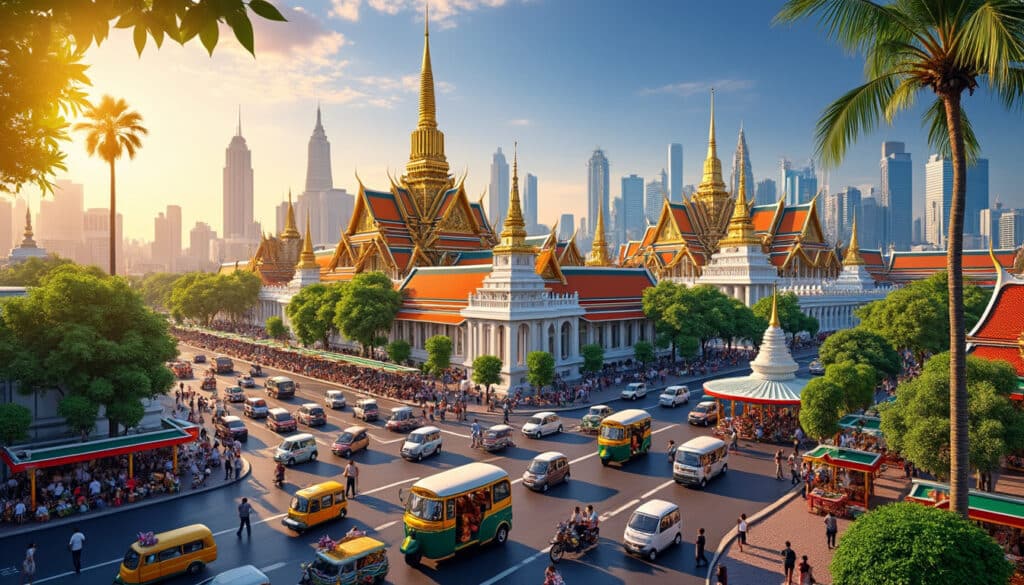
Fun Facts & Curiosities About Bangkok
Bangkok, a vibrant blend of ancient traditions and modern marvels, captivates visitors with its endless energy. As Thailand’s bustling capital, the city offers a fascinating array of contrasts from its traditional temples to towering skyscrapers. It’s no wonder that Bangkok…
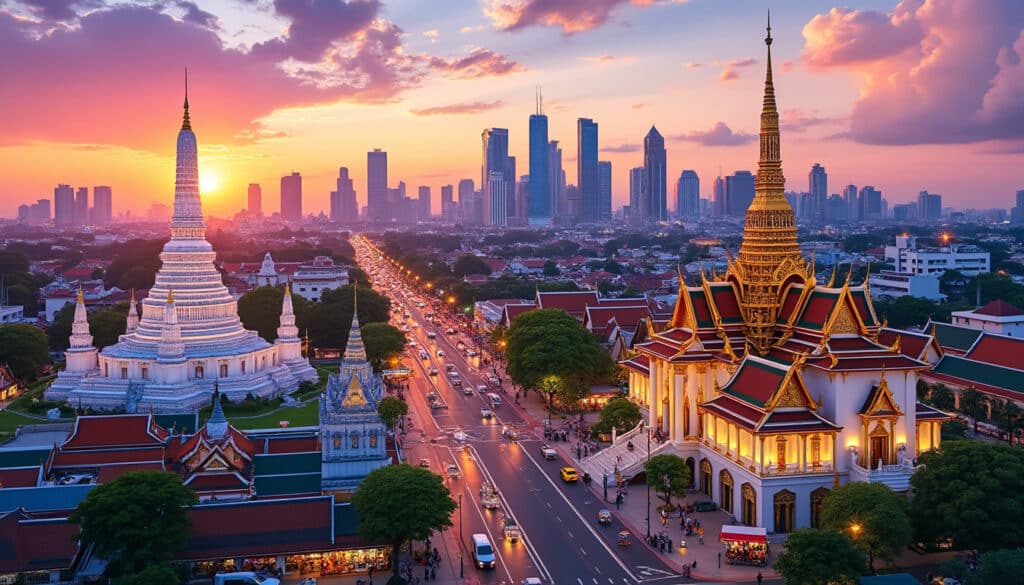
Architecture and urban features of Bangkok
Bangkok, a city that pulsates with life and color, is a mesmerizing tapestry woven with threads of tradition and threads of modernity. The juxtaposition of its ancient temples against sleek skyscrapers reflects its unique architectural identity. As Thailand’s vibrant capital,…
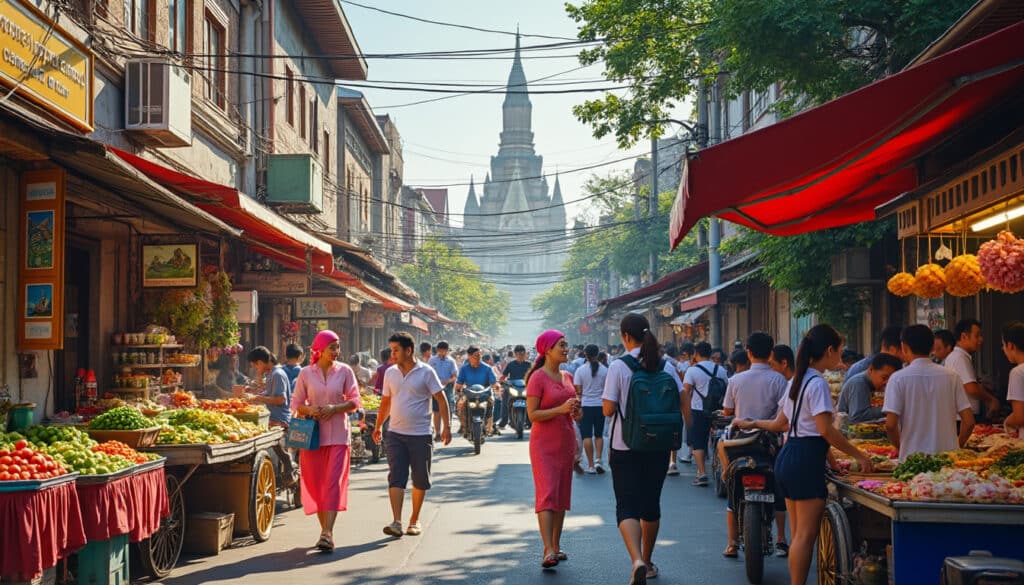
Discover the bustling energy of Bangkok, a city where ancient traditions and modern lifestyles coalesce under the glitz of neon lights and serene temple shadows. As the heart of Thailand, Bangkok pulsates with an unyielding vitality that captivates every visitor.…
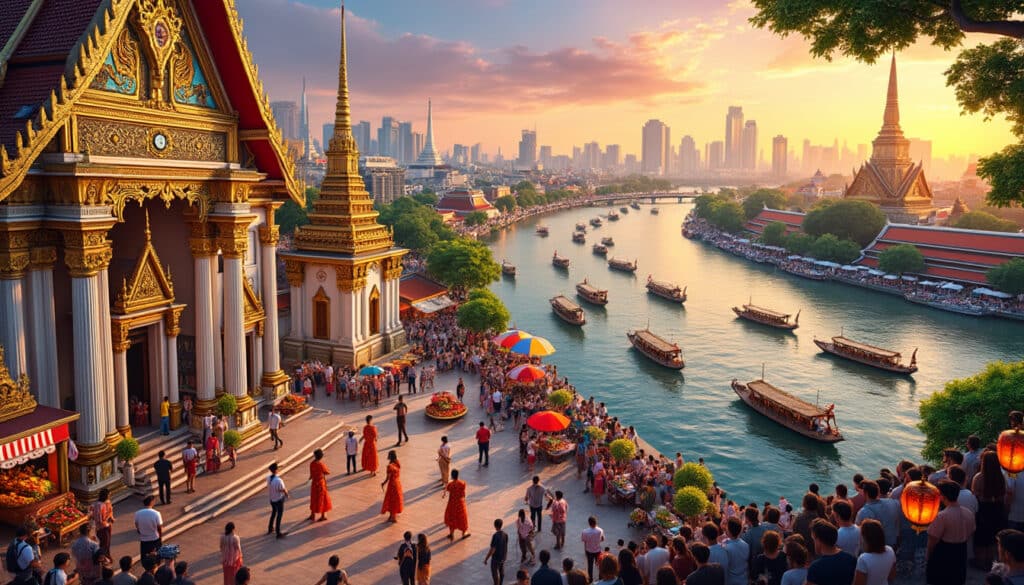
Welcome to the bustling heart of Thailand, where history meets modernity in a vibrant tapestry of culture, tradition, and innovation. Bangkok, known for its iconic landmarks and rich cultural heritage, is more than just a gateway to paradise—it is a…
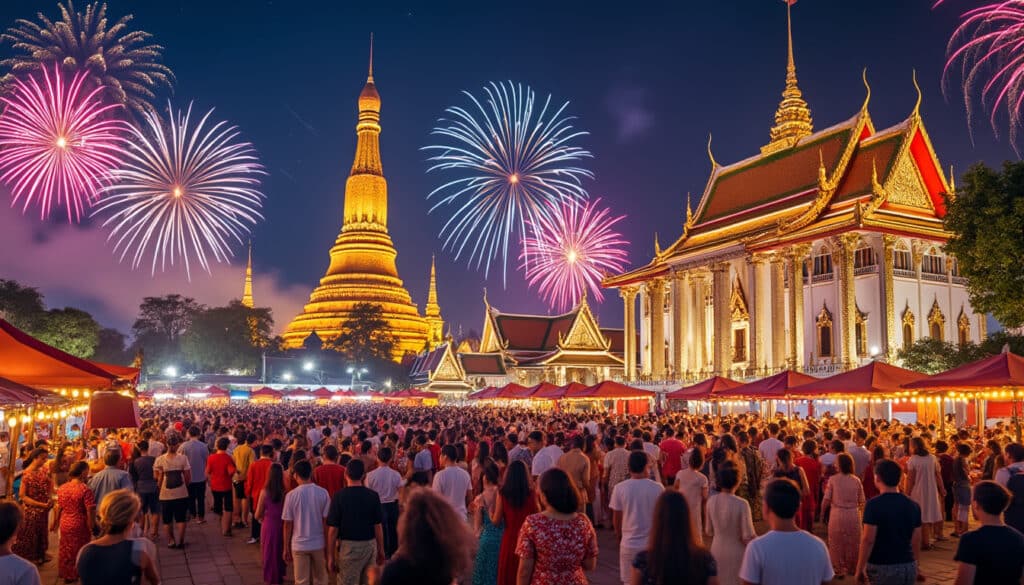
Holidays and celebrations in Bangkok
Bangkok, the vibrant capital of Thailand, is a city that never sleeps and a hub of festivities throughout the year. Whether it’s a traditional Thai festival or an international celebration, Bangkok is the place where locals and tourists come together…
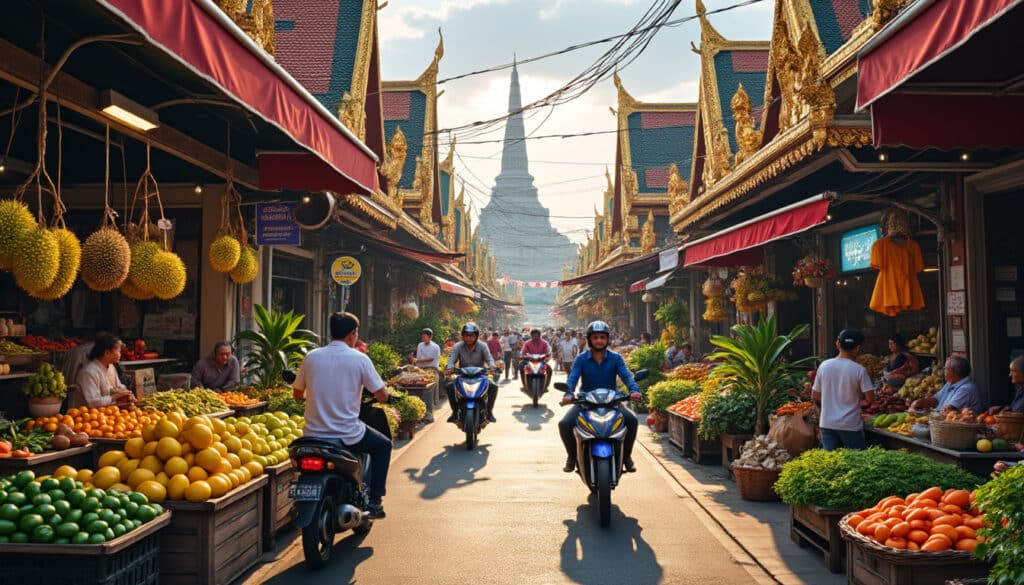
Language and spelling of Bangkok
The enchanting city of Bangkok, Thailand’s vibrant capital, harbors a captivating tapestry of languages. With its rich historical veins and bustling modern-day activities, the languages spoken in Bangkok reflect not only its local heritage but also its position as a…
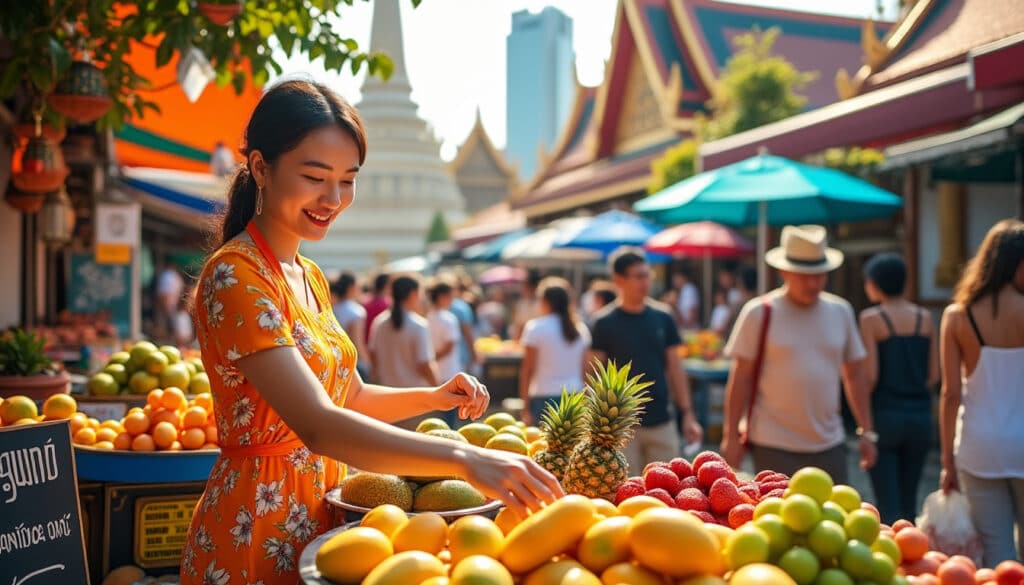
Local tips for tourists in Bangkok
Bangkok is a city rich in history, culture, and vibrant life, making it a must-visit destination for travelers seeking an unforgettable experience. Stepping beyond the well-trodden tourist paths, visitors can uncover hidden gems that offer a deeper understanding of local…
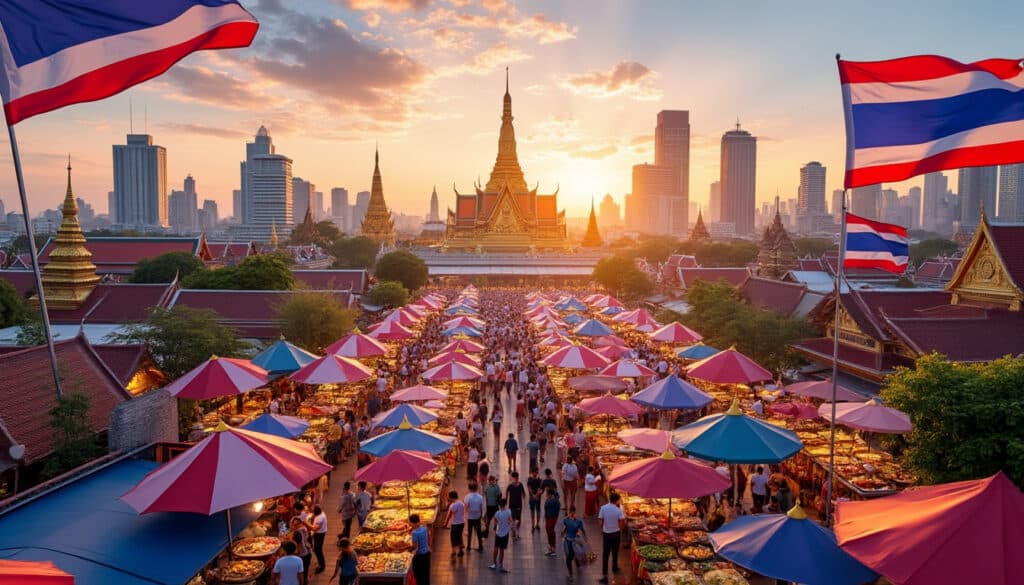
Names, flags, and identity of Bangkok
Bangkok, a city that pulsates with a mix of ancient traditions and modern dynamics, is more than just Thailand’s bustling capital. It’s a city with a rich tapestry of names, identities, and symbols that reflect its history and cultural depth.…
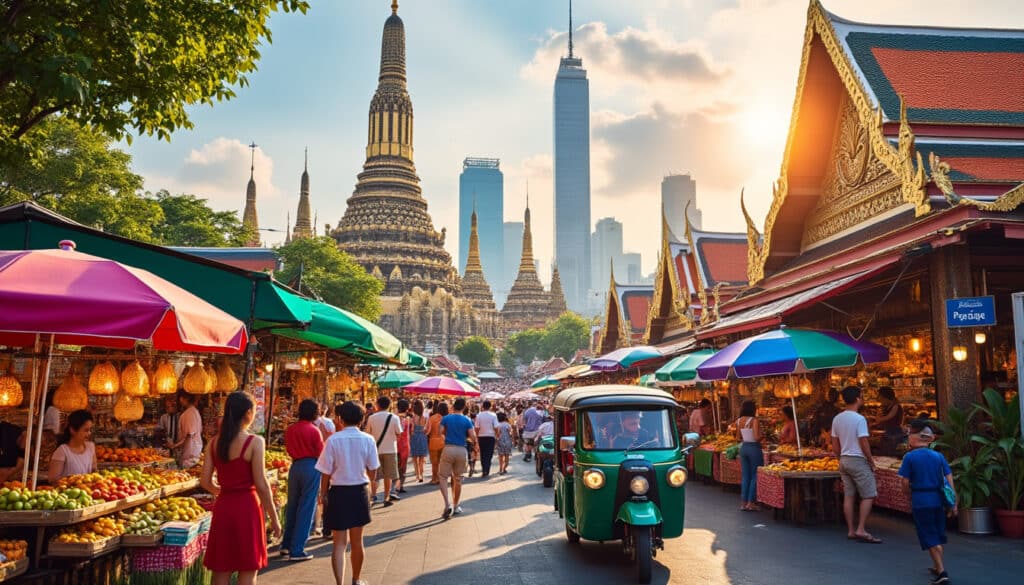
Reputation and identity of Bangkok
Bangkok, a city that pulses with life and energy, captivates the world with its unique blend of tradition and modernity. Its reputation as a vibrant and chaotic metropolis is matched only by its rich cultural heritage and flourishing tourism industry.…
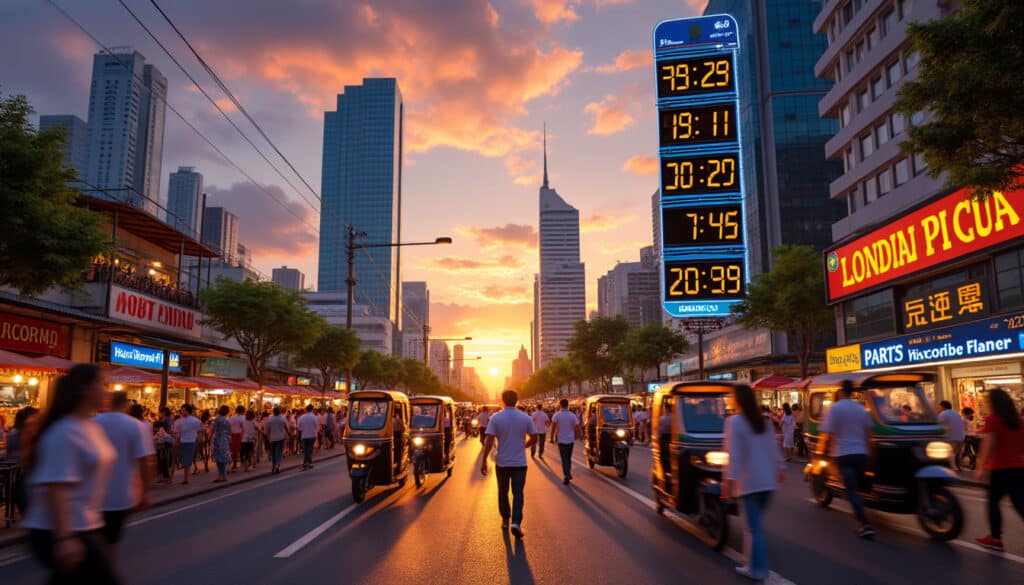
Understanding Bangkok’s time zone is crucial for travelers and residents alike, whether planning a journey or just coordinating with people across the globe. The local time, known as *Bangkok Time*, is part of the GMT+7 zone, highlighting its placement in…
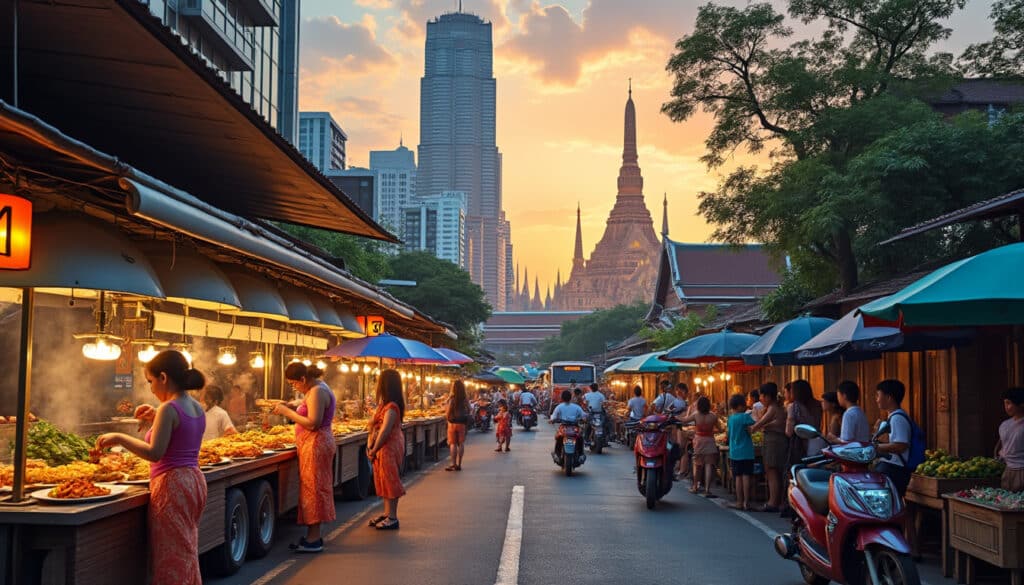
Unusual facts and social issues in Bangkok
Bangkok, known for its vibrant life and cultural richness, is a city of fascinating contrasts. While the shimmering temples and bustling streets capture the attention of travelers, there’s an intriguing side to the Thai capital that many may not immediately…

What does Bangkok look, smell, feel like?
Bangkok, a bustling metropolis at the heart of Thailand, is alive with an intriguing blend of sights, sounds, smells, and experiences that captivate every visitor. Known for its majestic Buddhist temples, vibrant street food scenes, and the ever-chaotic Chao Phraya…

